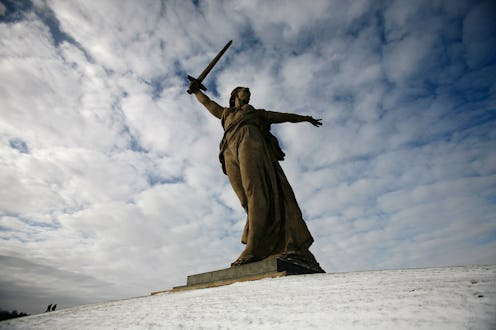News
Will Russia Be Safe Enough For The Olympics?
Only a day after a suicide bomber killed 17 people at a railway station in southern Russia, an explosion went off on a trolleybus in the same city of Volgograd Monday morning, leaving 10 people dead and scores more wounded. The attacks, which occurred 400 miles northeast of Sochi, have heightened fears of terrorism ahead of February's Winter Games.
No one has yet claimed responsibility for the attack, but Russia's National Anti-Terrorism Committee has confirmed that the explosion was most likely caused by a bomb, with federal investigators calling it a "terrorist act." Details are still emerging, but state TV showed images of the skeletal remains of the trolley-bus, with its roof bent and half-removed, surrounded by wreckage. "A blast happened inside a trolleybus in Volgograd, according to preliminary reports, 10 people died, 10 were wounded," said the spokeswoman for South Regional Center of Russia's Interior Ministry.
The blast comes less than 24 hours after a suicide bomber detonated explosives in Volgograd's train station, killing at least 15 people and wounding dozens more, underscoring the region's instability ahead of the Olympic Winter games, which start on Feb. 7. Although there was no immediate claim for Sunday's explosion, either, The Siberian Times identified Sunday's attacker as 26-year-old Oksana Aslanova, who they said had been married to two Islamic militant leaders killed by Russian forces.
Monday's attack is the third to rock the city in two months: In October, a female suicide bomber from the province of Dagestan killed six people in Volgograd. Many previous suicide bombings have occurred in the unstable North Caucasus republics, which include Dagestan, Chechnya, and Adygea, where violence and armed conflicts have dominated for nearly two decades. As recently as Friday, a car bomb exploded in Pyatigorsk — the center of a federal administrative district trying to stabilize the tense region — outside a police station, killing three.
Three years ago, a series of attacks was organized by Chechen rebel leader Doku Umarov— twin suicide bombings in 2010 that left 40 dead in Moscow, and one in 2011 that left over 30 people dead at Moscow’s Domodedovo Airport — but Umarov had called for a temporary halt to civilian-targeted violence. In July, however, he again ordered his forces to “do their utmost” to destroy the Sochi Olympics. “They plan to hold the Olympics on the bones of our ancestors, on the bones of many, many dead Muslims, buried on the territory of our land,” he said, calling on his forces “to use maximum force on the path of Allah to disrupt this Satanic dancing.”
The threats and attacks have prompted Russian authorities to install large-scale security forces around Sochi, the Black Sea resort city that will host the Winter Olympic Games in just over a month.
Photo via AFP
